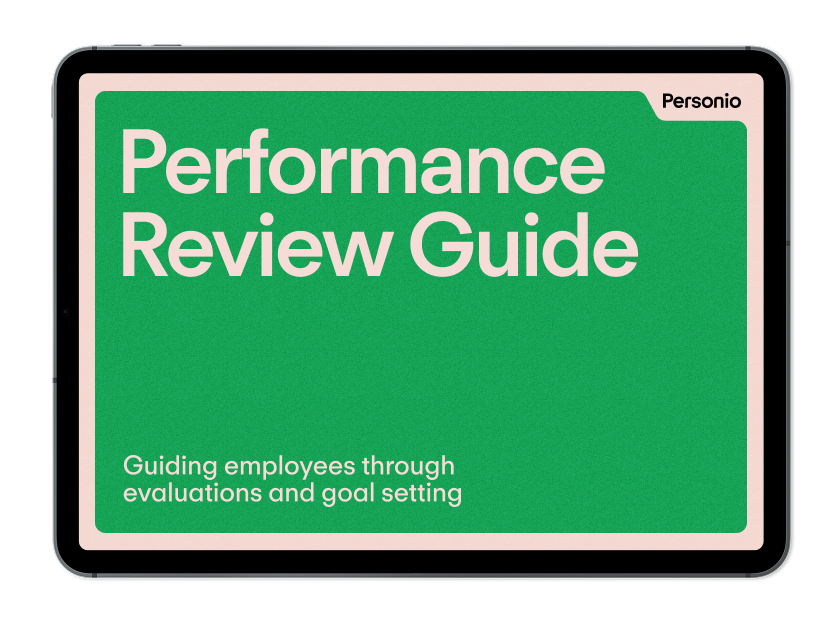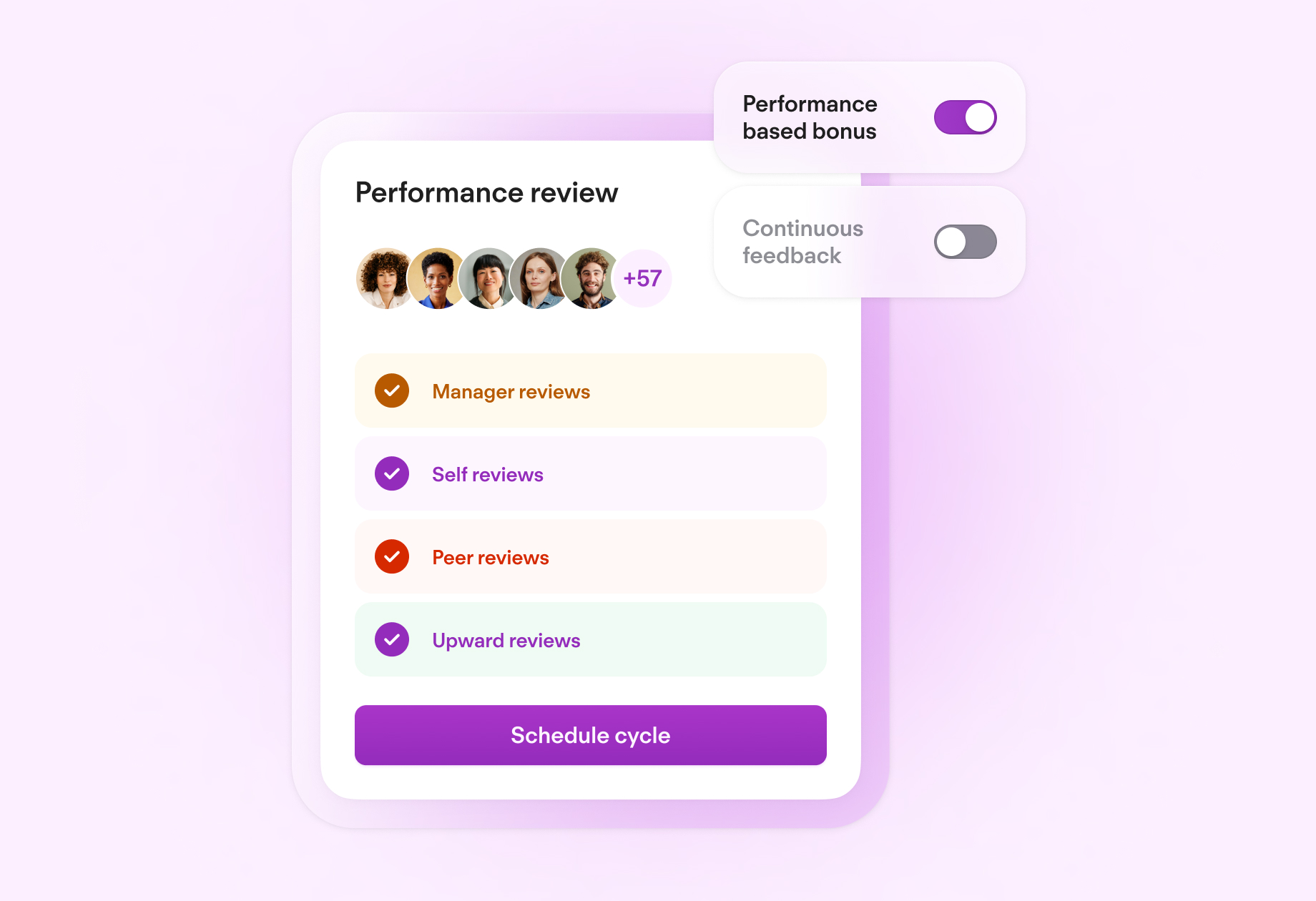What is a Probation Review? Meeting Questions, Tips & Template

Is a probation review meeting a matter of course or a hidden opportunity for HR teams? The end of a probationary period for employees can be a great chance to build out a future-focused plan – but, you need to make the meeting count.
In this article, we’re covering all things concerning probation reviews, why probation review meetings matter and the top probation review questions your managers need to ask today.
Here's how to use Personio to run reports on probation passers (and more).Contents
- 1What is a probation review?
- 2Probation periods in employment contracts
- 3Why are probationary reviews important?
- 4Are probation evaluations legally required in the UK?
- 5How to run probation review meetings
- 610 probation review meeting questions to ask
- 7What happens after a probation review meeting?
- 8Probation and performance go hand in hand
What is a probation review?
A probation review is a style of performance appraisals consisting of meeting at the end of an employee's probationary period to assess their performance and decide on a extension of employment. They most typically occur somewhere between 3-6 months from an employee's hire date.
In general, a probation review meeting provides an opportunity for a manager to evaluate the employee's present performance, offer helpful feedback and determine their overall probation status. They typically last around an hour, but this varies by organisation.
A probation review is both mandatory and optional. It is mandatory to run them when it comes to continued employment, but they are optional in how you choose to run them (because there is no set legal standard). Organisations have free reign to conduct a review that comports with their values, culture and working style.
Enable your line managers to host great performance conversations

Download our performance review template to help your teams design, structure and run performance reviews that truly make the grade. Grab your copy for free right now.
Find your copy hereProbation periods in employment contracts
Let’s take a quick step back and talk about probation periods.
If you choose to include a probationary period in your employment contracts, make sure you cover the basics, including;
How long it will last
If it can be extended (and, if so, under what circumstances)
Whether an employee can appeal if their period is not completed or if a decision is made not to continue their employment
The contract should also state when interim reviews, if any, will take place (e.g. weekly meetings) and how they will be informed of the next steps, once their probation is over.
Why are probationary reviews important?
While a probationary review may seem like an extra step in an already-long hiring process, it is still a crucial part of the employee lifecycle. Probation reviews help assess how an employee is doing, how they might improve and how the organisation can improve, too.
If we consider both the benefit of the employee and of the organisation, we can start to draw out a compelling case for focusing in on probation reviews. While many organisations may view them as a tickbox exercise, they can be much more:
For employers, they provide a structured way to assess whether a new hire is meeting expectations and thriving in the role.
For employees, probationary reviews offer valuable feedback and a chance to voice any concerns or challenges.
This level of two-way communication and collaboration can have a positive knock-on effect when it comes to employee satisfaction, productivity and retention.
Are probation evaluations legally required in the UK?
As far as employment law is concerned, no. Probation reviews are not legally required in the UK. But as far as contract law is concerned, they’re a good idea.
The Citizens Advice Bureau says that “legally, there’s no such thing as a probationary period. Once you’ve started work, the number of weeks you’ve worked begins on the day you’ve started, not from the time when your probationary period ended.” According to them, an employee’s contractual rights begin when an employee first starts working for you.
But what does the employee contract say?
Contracts can stipulate that certain requirements be met during this period. In this case, probation reviews may be essential to formalise the employment contract and show the employee has met expectations.
How to run probation review meetings
How do you run a great probation review? Given careful preparation and the right approach, it can be a pleasant experience even when it's not overwhelmingly positive. Here are some key steps for HR teams and managers alike:
1. Set the stage for open communication
Prioritise transparency: Be sure to set the tone upfront. Explain the purpose of the review, emphasise open and honest dialogue and encourage both parties to raise concerns and ask questions freely. It should serve as a forum.
Gather information: Review the employee's job description, performance metrics and any relevant feedback received during the probation period. This equips you with a data-driven foundation for the discussion.
Share the agenda: Provide the employee with a brief agenda beforehand, outlining the topics to be covered. This allows them to gather their thoughts and prepare any questions or points they want to raise.
2. Set clear expectations and goals
Review performance: Discuss the employee's progress against established goals and expectations. Use specific examples to illustrate strengths, areas for improvement and any ongoing challenges.
Refine targets: Collaboratively refine or adjust goals for the remainder of the probation period, ensuring they are clear, measurable and achievable. This can help foster a sense of ownership and shared responsibility.
Identify development opportunities: Explore potential training programmes, mentorship opportunities or specific tasks that can help the employee address identified weaknesses and further develop their skills.
3. Foster a collaborative dialogue
Active listening: Pay close attention to the employee's perspective, concerns and questions. Show genuine interest in their feedback and experiences.
Ask open-ended questions: Encourage the employee to elaborate on their thoughts and feelings. Avoid yes-or-no questions that limit the conversation.
Provide constructive feedback: Focus on specific behaviours and actions rather than personal attacks. Offer specific suggestions for improvement and emphasise the desire to help the employee succeed.
4. Document the discussion and next steps
Take notes: Document key points, agreements and action items during the meeting. This ensures clarity and accountability on both sides.
Summarise key takeaways: Briefly summarise the discussion's main points and next steps for both the employee and manager. This reinforces understanding and keeps everyone on the same page.
Schedule a follow-up meeting: Use this meeting to check on progress and provide further support or feedback as needed. This demonstrates ongoing commitment to the employee's development.
Probation reviews are, on one hand, about deciding on an employee's future. On the other, they are a development opportunity for employees whether or not they remain part of your organisation. Your team should lean into that side of the equation.
By prioritising transparency, setting clear expectations, fostering a collaborative dialogue and documenting the process, you can ensure these meetings become valuable stepping stones in building a successful and fulfilling working relationship.
10 probation review meeting questions to ask
While probation review questions should be open-ended (i.e. not just answerable with a yes or a no), it’s really helpful to ask questions that allow both parties to reflect on the current relationships. Keep them informal, be honest and make sure there’s room for constructive feedback on both sides.
Here are a ten probation review example questions worth asking:
Are you enjoying the job?
How do you think you’re doing?
What do you feel like you’ve accomplished during your time here?
Do you understand the job requirements and expectations?
Is this what you thought you’d be doing?
Where do you think you could have done things better?
Has anything made it hard for you to do your job well?
What help do you need to keep doing this job, or doing it better?
Do you need any specific training or support?
What would you like to achieve in the next few months? (Your goals)
Once the manager has asked the questions, the next steps are to give the employee constructive feedback and create an action plan. Both parties should agree on a date for the next meeting, if one is required, and set goals to achieve by then.
A probation review is a lot like a performance review

In fact, you might say that the two are one in the same. Help your line managers and employees host and have better performance conversations with Personio. Our all-in-one HR software can ensure you never miss a crucial performance conversation again.
Show me how Personio helpsWhat happens after a probation review meeting?
A probation review meeting can conclude in three ways:
The employee passes their probation and becomes a full member of the team.
The employee meets some, but not all, of their expectations and their probation period is extended – allowing them an opportunity to improve.
The employer and employee agree to terminate the relationship.
If they’re staying, feel free to celebrate! You’ve hired a great employee and they’re a good fit for your corporate culture.
If they’re staying, but need to put in a bit more effort, be clear but firm about how they can improve their performance. Perhaps with a performance improvement plan (PIP).
If they did not pass their performance, go through the employee termination procedures (such as removing them from email, database and workflow systems, etc).
Extending the probationary period
There are some cases where a probation period may need to be extended. This is most often due to unforeseen circumstances that necessitate an extension. This gives valuable time to the employee and the business to assess their options.
The most typical reasons for a probation period extension include:
Significant absence due to illness or injury
Lack of adequate training or resources
Unforeseen changes in the role or company
Performance below expectations, but with potential for improvement
How long should the extension be? Generally, an extension should last between one to three months. This is done to give a healthy window where an employee can receive a fair and equitable evaluation regardless of the circumstances that prompted the extension.
Key insight: By approaching it with transparency and a focus on development, you can turn this temporary setback into a positive step towards mutual success.
Probation and performance go hand in hand
Done right, an end of probation meeting is a chance for employees to support the right employees to improve their performance and set them up for greater things in future.
But, it’s difficult for managers to focus on performance when they have a mountain of paperwork or a cumbersome process standing in their way.
Personio help can automate performance reviews and the entire performance management process from our all-in-one HR software. We'd be happy for you to chat with an expert today to see how it's done, and how it can meet the unique needs of your team.